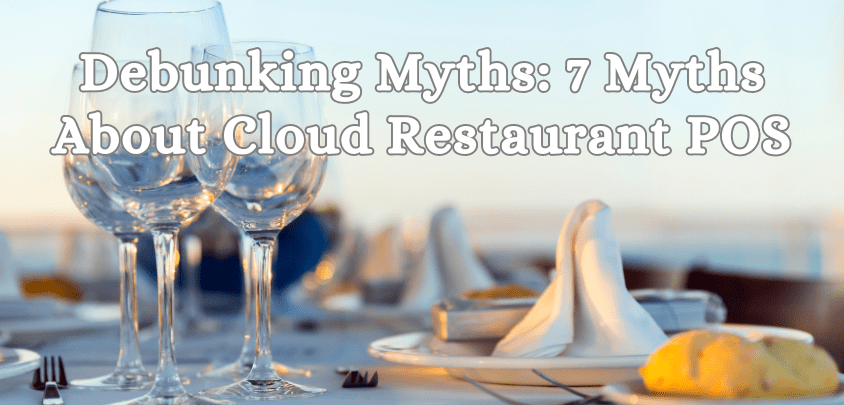Debunking Myths: 7 Myths About Cloud Restaurant POS

In the ever-evolving landscape of restaurant technology, cloud-based Point of Sale (POS) systems have become increasingly popular. These systems offer numerous benefits, from flexibility and scalability to enhanced data security. However, despite their advantages, there are still several misconceptions surrounding cloud restaurant POS. In this article, we aim to debunk six common myths about these innovative solutions.
7 Big Myths About Restaurant Cloud POS Systems
Myth 1: Cloud POS Systems Are Less Secure Than Traditional Systems
There's a common belief that because cloud POS systems operate online, they are inherently less secure than traditional on-premise systems. Many people worry about the safety of sensitive data like customer payment information stored in the cloud.
Reality: Cloud POS providers prioritise security and invest heavily in robust measures such as encryption, data redundancy, and regular security updates. Additionally, cloud systems often offer superior security features like remote data backup and multi-factor authentication, making them highly secure platforms for handling sensitive customer data.
Myth 2: Cloud POS Systems Are Expensive
Some believe that implementing a cloud POS system will incur significant upfront costs and ongoing expenses, making it unaffordable for small to medium-sized restaurants.
Reality: While there may be initial setup costs and subscription fees, cloud POS systems typically offer a more affordable pricing structure compared to traditional POS systems. Additionally, cloud POS eliminates the need for costly hardware investments and maintenance, resulting in significant cost savings over time.
Myth 3: Cloud POS Systems Require Constant Internet Connectivity
It's commonly thought that cloud POS systems rely entirely on an internet connection to function properly. Concerns arise about downtime and operational disruptions during internet outages.
Reality: While internet connectivity is necessary for real-time data synchronisation, many cloud POS providers offer offline mode capabilities. This allows restaurants to continue processing transactions and storing data locally during internet outages, ensuring uninterrupted operations and customer service.
Myth 4: Cloud POS Systems Are Complex to Implement and Use
There's a misconception that migrating to a cloud POS system will be a complicated and time-consuming process. Some fear that staff will struggle to learn how to use the new system effectively.
Reality: Cloud POS systems are designed to be user-friendly and easy to implement. Providers offer intuitive interfaces and comprehensive training and support resources to help restaurant staff quickly adapt to the new system. Additionally, cloud POS solutions are highly customisable, allowing restaurants to tailor the software to their specific needs without extensive IT expertise.
Myth 5: Cloud POS Systems Are Only Suitable for Large Chains
Some believe that cloud POS systems are primarily designed for large restaurant chains with extensive resources and complex operational needs.
Reality: Cloud POS systems are equally well-suited for small and independent restaurants. They offer scalability, allowing businesses of all sizes to expand their operations seamlessly without additional infrastructure investments. Furthermore, cloud POS systems can be tailored to accommodate the unique requirements of individual restaurants, making them an ideal choice for businesses of any scale.
Myth 6: Cloud POS Systems Lack Integration Capabilities
It's often thought that cloud POS systems cannot integrate effectively with other restaurant management tools and third-party applications, limiting their functionality and utility.
Reality: Many cloud POS providers offer extensive integrations with various software platforms, including inventory management, accounting, and online ordering systems. These integrations streamline operations, improve efficiency, and provide valuable insights into restaurant performance, enhancing the overall customer experience.
Myth 7: Cloud POS Systems Lack Reliability
Some sceptics may argue that cloud-based systems are less reliable than traditional on-premise solutions, citing concerns about server downtime, data loss, or system crashes.
Reality: Cloud POS providers invest in robust infrastructure and redundancy measures to ensure high levels of reliability. They often use multiple servers and data centres to minimise downtime and maintain system availability. Additionally, regular backups and data replication protocols are in place to prevent data loss and ensure business continuity in the event of unforeseen circumstances.
Bonus Content: Why Restaurants Fail?
Overcoming Misconceptions: Addressing the Myths Surrounding Cloud Restaurant POS
The prevalence of myths surrounding cloud restaurant POS systems can often disturb business owners and deter them from considering these innovative solutions. When influenced by these misconceptions, restaurant owners may hesitate to adopt cloud POS technology, fearing potential risks to their operations.
However, succumbing to these myths poses its own set of risks, including missed opportunities for increased efficiency, cost savings, and improved customer service. It's crucial for business owners to recognise that these myths are often based on misinformation rather than factual evidence. To overcome these doubts, restaurant owners can take proactive steps, such as contacting POS companies directly to ask questions and address any concerns they may have. By engaging with industry experts and seeking clarification, business owners can make informed decisions about implementing cloud restaurant POS systems and unlock the numerous benefits they offer for their operations.
The Vital Role of POS Systems in Restaurant Business Operations
POS systems play a crucial role in enhancing the efficiency and profitability of restaurants. Beyond simply processing transactions, modern POS systems contribute significantly to various aspects of a restaurant's business operations. They provide real-time insights into sales data, inventory levels, and customer preferences, enabling informed decision-making and strategic planning. Additionally, POS systems streamline order management, reduce errors, and enhance order accuracy, resulting in improved customer satisfaction and loyalty.
In conclusion, understanding the reality behind these misconceptions is crucial for informed decision-making when it comes to adopting cloud restaurant POS systems. We recommend you get a cloud restaurant POS over traditional systems. You can confidently embrace cloud technology to streamline operations, increase profitability, and stay competitive in today’s dynamic market.